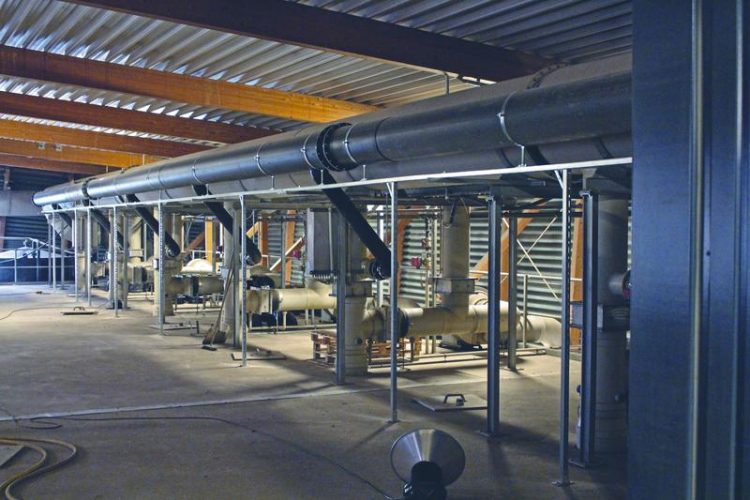Reducing household waste with less energy

The exhaust air pipes on the rotting box allow to split the exhaust flows of the biological treatment depending on the degree of exposure and to treat them separately. © RWTH Aachen University, Department of Processing and Recycling
Optimised exhaust air purification for mechanical-biological waste treatment
The non-recyclable waste residue from the grey bin passes through an aerobic rotting process in the composting tunnels in the MBT system. This oxidises all organic components. After the treatment, the residue can be deposited in landfill sites without the risk of it forming methane or other climatically relevant gases.
The exhaust air from the tunnels must be cleaned and treated in order to prevent harmful gas and odour emissions. For this purpose, bio-filters, scrubbers and a combustion unit are used for the carbon-containing gases. With the new system, the researchers have optimised the entire process chain.
The energy savings were achieved mainly by reducing and dividing the exhaust air currents according to their carbon content and through the resulting decrease in the support gas consumption. An improved method for feeding the waste into the tunnels has also contributed to this.
In Germany there are currently 45 facilities providing mechanical biological waste treatment. The energy-saving exhaust air cleaning system underwent practical testing at the MBT facility operated by the rural district of Aurich in Großefehn.
The Institute for Treatment and Recycling at RWTH Aachen carried out the project together with co-operation partners.
You found all informations about the BINE Projektinfo brochure entitled “Reducing energy use from waste treatment” here:
http://www.bine.info/en/press/press-releases/press/pressemitteilung/hausmuell-mi…
Uwe Milles/Birgit Schneider
presse(at)bine.info
About BINE Information Service
Energy research for practical applications
The BINE Information Service reports on energy research topics, such as new materials, systems and components, as well as innovative concepts and methods. The knowledge gained is incorporated into the implementation of new technologies in practice, because first-rate information provides a basis for pioneering decisions, whether in the planning of energy-optimised buildings, increasing the efficiency of industrial processes, or integrating renewable energy sources into existing systems.
About FIZ Karlsruhe
FIZ Karlsruhe – Leibniz Institute for Information Infrastructure is a not-for-profit organization with the public mission to make sci-tech information from all over the world publicly available and to provide related services in order to support the national and international transfer of knowledge and the promotion of innovation.
Our business areas:
• STN International – the world’s leading online service for research and patent information in science and technology
• KnowEsis – innovative eScience solutions to support the process of research in all its stages, and throughout all scientific disciplines
• Databases and Information Services – Databases and science portals in mathematics, computer science, crystallography, chemistry, and energy technology
FIZ Karlsruhe is a member of the Leibniz Association (WGL) which consists of 87 German research and infrastructure institutions.
http://www.bine.info/en – BINE Informationsdienst
Media Contact
All latest news from the category: Ecology, The Environment and Conservation
This complex theme deals primarily with interactions between organisms and the environmental factors that impact them, but to a greater extent between individual inanimate environmental factors.
innovations-report offers informative reports and articles on topics such as climate protection, landscape conservation, ecological systems, wildlife and nature parks and ecosystem efficiency and balance.
Newest articles

Time to Leave Home? Revealed Insights into Brood Care of Cichlids
Shell-dwelling cichlids take intense care of their offspring, which they raise in abandoned snail shells. A team at the Max Planck Institute for Biological Intelligence used 3D-printed snail shells to…

Smart Fabrics: Innovative Comfortable Wearable Tech
Researchers have demonstrated new wearable technologies that both generate electricity from human movement and improve the comfort of the technology for the people wearing them. The work stems from an…

Going Steady—Study Reveals North Atlantic’s Gulf Stream Remains Robust
A study by the University of Bern and the Woods Hole Oceanographic Institution in the USA concludes that the ocean circulation in the North Atlantic, which includes the Gulf Stream,…



